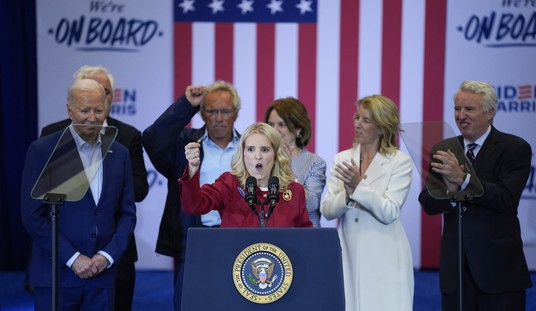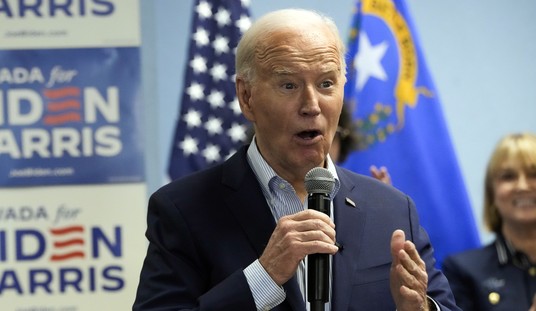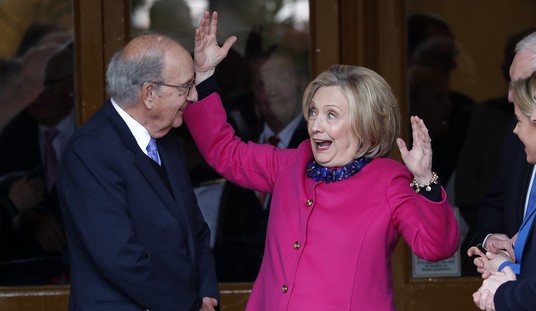Deputy White House Counsel Patrick Philbin emerged during the Senate impeachment trial as the superstar among the President’s men, in my opinion. His presentations were dispassionate, detailed, direct, and devastating to the House managers’ case, as previously detailed here, here, here, here, here, and here.
How could I not cover his closing arguments, which following his same penchant for facts, logic, and respect for the Constitution? Here are his remarks from Tuesday afternoon:
Philbin: We’ve heard repeatedly throughout the last week-and-a-half or so that the President is not above the law. And I’d like to focus in my last remarks here on an equally important principle, which is that the House of Representatives also is not above the law in the way that they conduct the impeachment proceedings and bring the matter here before the Senate because in very significant and important respects, they didn’t follow the law. From the outset, they began an impeachment inquiry without a vote from the House, and therefore without lawful authority delegated to any committees to begin any impeachment inquiries against the President of the United States. That was unprecedented in our history. The Speaker of the House does not have authority by holding a press conference to delegate the sole power of impeachment from the House to a committee.
And the result was 23 totally unauthorized and invalid subpoenas were issued at the beginning of this impeachment inquiry. After that, the House violated every principle of due process and fundamental fairness in the way that the hearings were conducted. … It is significant because denying the President the ability to be present through counsel, to cross-examine witnesses, and to present evidence fundamentally skewed the proceedings in the House of Representatives. It left the President without the ability to have a fair proceeding, and it reflected the fact that those proceedings were not truly designed as a search for truth. We have procedural protections; we have the right of cross-examination as a mechanism for getting to the facts. And that was not present in the House of Representatives. And lastly, Manager Schiff, as an interested witness, who had been involved with … or who at least his staff had discussions with the whistleblower … then guided the factual inquiry in the House.
So why does all of this matter? It matters because the lack of the vote meant that there was no democratic accountability and no lawful authorization for the beginning of the process. It meant that there were procedural defects that produced a record that this chamber can’t rely on for any conclusion other than to reject the articles of impeachment and to acquit the President. And it mattered because the President, in response to these violations of the President’s rights, with the failure to follow proper procedure, with the failure to follow the law, has rights of his own … rights of the executive branch to be exerted. And that’s the President’s response to the invalid subpoenas … that they’re invalid and we’re not going to comply with them. And the President exerted other rights of the executive branch. When there were subpoenas for his senior advisers to come and testify, along with virtually every president since Nixon, he asserted the principle of immunity of his senior advisers that they could not be called to testify. And the President asserted the defects in subpoenas that called for executive branch officials to testify without the presence of agency counsel. All established principles that had been asserted before.
And what did the House managers say in response? They accused the President in their second article of impeachment that this was unprecedented response and unprecedented refusal to cooperate. It was unprecedented that 23 subpoenas were issued in a presidential impeachment inquiry without valid authorization from House. The President’s response was to a totally unprecedented attempt by the House to do that which it had no authority to do. They’ve asserted today and on other occasions that the President’s legal arguments in response to these subpoenas … they’ve said that it’s indiscriminate … that there was just a blanket defiance. I think I’ve shown that that wasn’t true. There were three very specific legal rationales provided by the executive branch as to different defects in different subpoenas. And there were letters explaining those defects, but there was no attempt by the House to attempt an accommodations process even though the White House offered to engage in an accommodations process. There was no attempt by the House to use other mechanisms to resolve the differences with the executive branch … it was just straight to impeachment.
Now they’ve asserted today and on other occasions the President’s, that I and my colleagues have bad faith legal arguments that are just window-dressing. Now in an ordinary court of law, one doesn’t accuse opposing counsel of making bad faith arguments lightly, and if you make that accusation, it has to backed up with analysis. But there hasn’t been analysis here; there has just been accusation.
When the President asserts the immunity of his senior advisers, that’s principle that’s been asserted by just about every president since Nixon. And let me read to you what Attorney General Janet Reno, during the Clinton Administration, said about this exact immunity: “The immediate advisers to the President are immune from being impelled before Congress, and the immunity that such advisers enjoy from testimonial compulsion by the congressional committee is absolute and may not be overborne by competing congressional interests.” And she went on to say, “Compelling one of the President’s immediate advisers to testify on a matter of executive decision-making would raise serious constitutional problems not matter what the assertion of congressional need.”
Was that bad faith? Was Attorney General Reno asserting that principle in bad faith on behalf of President Clinton? President Obama asserted the same principle for his senior political advisers. Was that bad faith? Of course not. These are principles defending the separation of powers that presidents have asserted for decades. President Trump was defending the institutional interests of the office of the presidency in asserting the same principles here. That is vital for the continued operation of the separation of powers.
The House managers have also said that once the President asserted these defects in their subpoenas and resisted them, they had no time to do anything else – they just had to go straight to impeachment. They couldn’t accommodate, they couldn’t go through a contempt process, they couldn’t litigate. But the idea that there is no time for dealing with that friction with executive branch is really antithetical to the proper functioning of the separation of powers. It goes against the way that part of the separation of powers is supposed to work – that inter-branch friction is meant to take time to resolve. It’s meant to slow things down and to be somewhat difficult to work through, and to force the branches to work together to accommodate the interests of each branch. Not to just jump to the conclusion that we had no time for that – we have to assert absolute authority on one side of the equation.
And this is something that Justice Brandeis pointed out in a famous dissent in a case that has since been cited many times by the court majority. He said, “The doctrine of the separation of powers was adopted by the Convention of 1787 not to promote efficiency …” – so he’s saying not to make government move quickly – “… but to preclude the exercise of arbitrary power. The purpose was not to avoid friction, but by means of the inevitable friction incident to the distribution of the governmental powers among the departments to save the people from autocracy.” That is a vitally important principle the friction between the branches – even if it means taking longer, even if it means not jumping straight to impeachment – it’s part of the constitutional design, and it’s required to force the branches to determine incrementally where there interests lie so as to solve the disputes incrementally and not to jump straight to the ultimate nuclear weapon in the Constitution.
We’ve also heard from the House managers that everything the President did here – asserting the prerogatives of his office, asserting the principles of immunity – must be wrong, must be rejected because only the guilty will assert a privilege. Only the guilty won’t allow evidence. That is definitely NOT a principle of American jurisprudence. It’s antithetical to fundamental principles of our system of laws. As we pointed out in our trial memorandum, case law, and other decisions, the Supreme Court has made clear that the very idea of punishing someone for asserting rights or privileges – or suggesting that asserting a right of privilege is evidence of guilt is contrary to basic principles of due process. And it takes on an even more malignant tenor to it when the principle is asserted in a dispute between the branches relating to the boundaries of their relative powers. Because what the House is essentially asserting in this case is that any assertion of the prerogatives of the office of the president … any attempt to maintain the principle of separation of powers, of executive confidentiality that has been asserted by past presidents … can be treated by the House as evidence of guilt. And here, there entire second article of impeachment is structured on the assumption that the House can treat the assertion of principles grounded in the separation of powers as an impeachable offense. Boiled down to its essence, it is an assertion that defending the separation of powers … if the President does it in a way that they don’t like, and at a time that they don’t like … can be treated as an impeachable offense.
That’s an incredibly dangerous assertion because if it were accepted, it would fundamentally alter the balance between the different branches of our government. It would suggest – and Professor Turley explained this – Professor Dershowitz explained it here – that if Congress makes a demand on the executive and the executive resists, based on separation of powers principles that past presidents have asserted, Congress can nonetheless say we have decided to proceed by impeachment. We have the sole power – and this is the principle that they assert in the House Judiciary Committee report – we have the sole power of impeachment – that means we are the sole judge of our own actions … there’s no need for accommodation, there’s no need for the courts … we will determine that any resistance that you provide is itself impeachable. That would fundamentally transform our government by essentially giving the House the same sort of power as a parliamentary system to use impeachment as in effect a vote of no confidence against a prime minister, not the way the Framers set up our three-branch system of government with a powerful executive who would be independent from the legislature. That’s why Professor Turley explained that the second article of impeachment here would be an abuse of power by Congress. It would make the executive dependent on Congress, and that is antithetical to the system that the Framers envisioned.
So why is it that there are all these defects in the House managers’ case for impeachment? Why are they asserting principles like, that only the guilty would assert privileges? That’s not part of our system of law. Why are they asserting that, if the executive resists, that the House has the sole power to determine the boundaries of its own power in relation to the executive – also not something that is in our system of jurisprudence? And why the lack of due process in the proceedings below? I think it’s because as we’ve explained, this was a purely partisan impeachment from the start. It was purely partisan and purely political. And that is something that the Framers foresaw. And I’ll point to one passage from Federalist No. 65. A number of different passages from that have been cited over the course of the past week, but I don’t think this one has. It’s just after Hamilton points out that he warns that an impeachment in the House could the be result of a “persecution of an intemperate or designing majority in the House of Representatives.” And then he goes on: “Though this latter supposition may seem harsh, and might not likely often to be verified, yet it not ought to be forgotten that the demon of faction will at certain seasons extend his scepter over all numerous bodies of men.” And that’s very 18th century language. We don’t talk about demons extending their scepter over men. But, it’s prescient nonetheless. We might not be comfortable with the terms, but it’s accurate for what can happen.
And that is what has happened in this impeachment. This was a purely partisan political process. It was imposed by partisans in the House. It was done by a process that was not designed to persuade anyone or to get to the truth or to provide process and to abide by past precedents. It was done to get it finished by Christmas on a political timetable. And it’s not something that this chamber should condone. That in itself provides a sufficient and substantial reason for rejecting the articles of impeachment.
End of Philbin’s fabulous remarks! To briefly summarize:
- The House process did not follow the law
- The House issued invalid subpoenas and chose not to correct the process for reasons of political expediency
- The House denied the President due process rights: the right to be represented and to cross-examine witnesses
- The denial of the President’s due process rights precluded the ability of the House to get to the truth of the matter
- Schiff was an interested witness with a conflict of interest and should never have been involved in guiding the inquiry in the House
- The President followed long-established legal precedent every step of the way; the assertion of those privileges cannot be considered unlawful or “obstruction of Congress”
- The House abused power by rushing to impeachment without exploring other mechanisms to resolve inter-branch conflicts
- The House managers’ calling of the exertion of privileges by the President to be “evidence of guilt” is contrary to long-standing traditions of American jurisprudence
- The House attempted to destroy the longstanding privilege of separation of powers in their article of impeachment alleging obstruction of Congress
- The House’s rush to impeachment was an entirely partisan political endeavor by the Democrats, about which James Madison specifically warned us in Federalist No. 65
- The House was driven by a political timetable which, in itself, is reason to reject the articles of impeachment
The end.












Join the conversation as a VIP Member